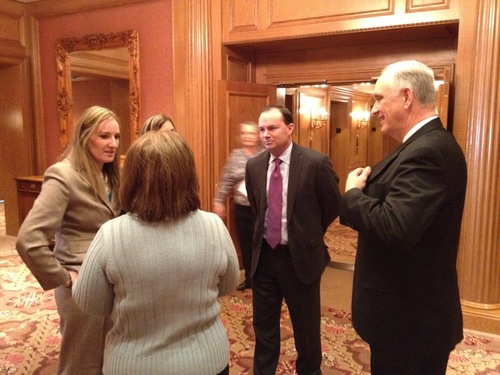This is an archived article that was published on sltrib.com in 2014, and information in the article may be outdated. It is provided only for personal research purposes and may not be reprinted.
Mike Lee, Rand Paul, Ted Cruz and Marco Rubio went to the Senate as young tea-party upstarts. Now three of the four are eyeing bids for the White House and political observers are predicting some brutal infighting. But Paul said Monday he doesn't anticipate that will cause problems among the group.
"I think it shakes out over time," said the Kentucky senator who, according to a new national poll last week is the Republican presidential frontrunner, albeit still more than 30 months from the next presidential election.
"I don't know if that's good luck or bad luck at this point," Paul said in an interview. "It's better than not being noticed, I guess."
Paul was in Salt Lake City to help Lee raise money for his Senate re-election bid in 2016. And he and his family also took some time to do some snowboarding.
Lee said for now none of his three colleagues have said they're running, so he's staying neutral.
"I'm a huge fan of Rand Paul and a huge fan of the other two, as well," said Lee. "We'll see what happens."
"But don't be thinking we won't be trying to twist his arm," said Paul.
Cruz was in Salt Lake City in September, just before the federal government shutdown, raising money for Lee.
In the Beltway, reports have surfaced in recent months of tension among the ranks of the tea-party senators, particularly between Paul and Cruz.
Much was made in the political press of Cruz taking jabs at Paul on "This Week" Sunday for his libertarian, isolationist stance on foreign policy; Paul retorted with a guest column on a conservative website where he criticized Republicans who make a name for themselves by trashing others, saying "splintering the party is not the route to victory."
Julian Zelizer, a professor of history and public affairs at Princeton University, said keeping the tea-party senators together is only going to get harder as they start to jockey for support among the same group of voters.
"If they were very different, if one was a real centrist or independent or moderate, then each could compete on their own ground. They're all running for the same votes and they all have the same identity and you have to knock the other person off," said Zelizer. "Paul and Rubio and Cruz are going to start launching the most brutal attacks you can imagine on each other."
"This coalition, which has been very effective in Congress as a new voice of the GOP, is really going to start to push against one another," he said.
Paul said he doesn't see the potential presidential runs creating clashes with his colleagues, since they agree on most of the issues and can focus on those instead of fighting over the narrow slice where they disagree.
"I think in the Senate, for the most part, things are on a cordial basis," he said.
According to a CNN poll released over the weekend, Paul is leading the field among Republican presidential hopefuls with 16 percent of the support. Rep. Paul Ryan, who was Mitt Romney's vice presidential running mate, came in at 15 percent and Texas Gov. Rick Perry had 11 percent.
Paul said one of his objectives is to increase the profile of some of the issues he has been standing for, like privacy of electronic records.
"We're trying to take the message of privacy and the Fourth Amendment and make it a Republican issue," Paul said. "I often tell Republican crowds you guys are good on the Second Amendment, but you can't keep the Second Amendment without the Fourth."
The message resonates with young voters, he said, because their whole life is on their phones and electronic devices, where they enjoy little protection.
If he does get in the race, Paul said the likely Democratic frontrunner for 2016, former Secretary of State Hillary Clinton, is "on the wrong side of history on so many of these things."
"She is very aggressive for being involved militarily around the world, so I think you could actually have a Republican nominee who is more libertarian-leaning, who is actually for a strong national defense but a little more reluctant to be involved in war," he said. "She hasn't been much of an advocate for privacy or reining in the intelligence [agencies]. She has been, I think, a facilitator of big government on both aspects, domestically and internationally."
Paul said he is talking about a potential bid with his family, but probably won't make a decision until after the November election or early next year.
Twitter: @RobertGehrke



